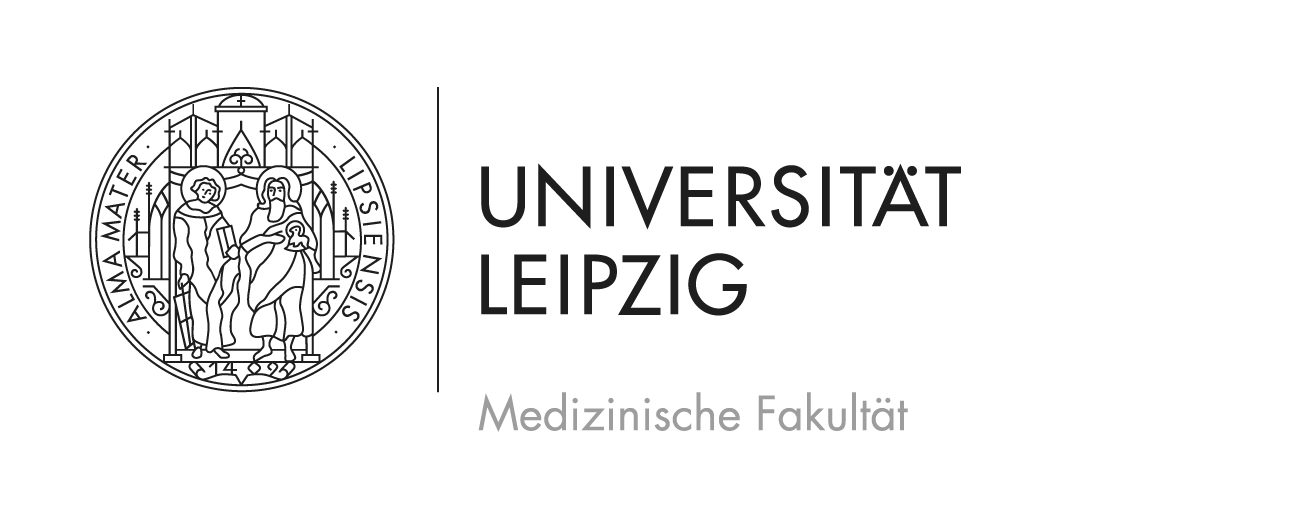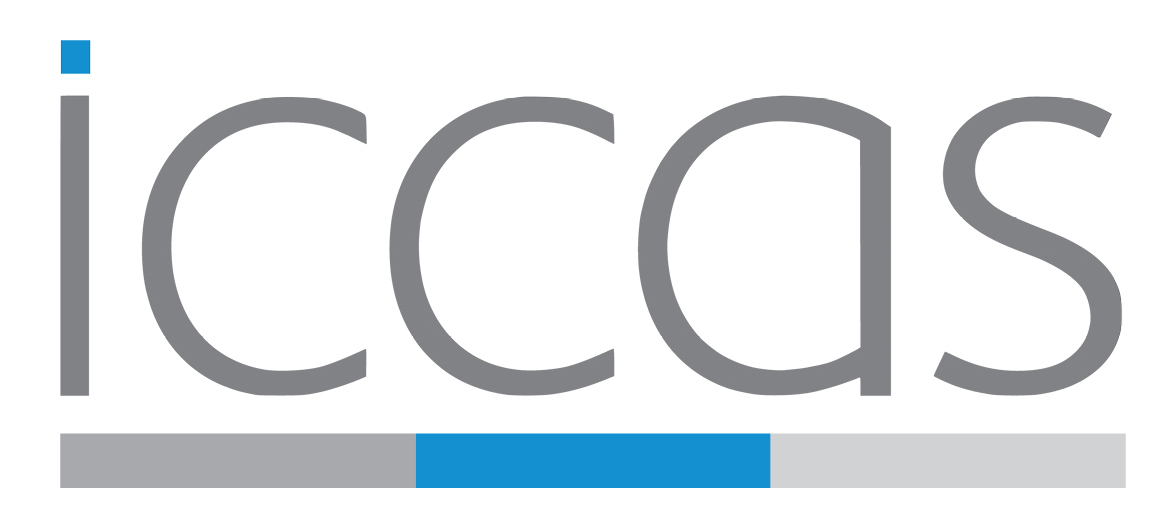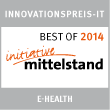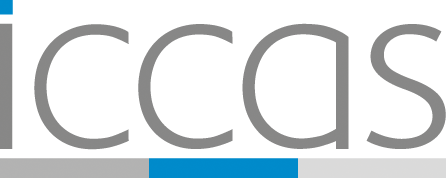03.04.2014
 ICCAS-Projekt mit Innovationspreis-IT „Best of 2014“ ausgezeichnet
ICCAS-Projekt mit Innovationspreis-IT „Best of 2014“ ausgezeichnet
Einmal im Jahr prämiert die Initiative Mittelstand herausragende IT-Lösungen, die einen hohen Nutzwert für kleine und mittelständische Unternehmen haben. In diesem Jahr konnte das am ICCAS entwickelte IT-System oncoflow die namhafte Jury aus über 100 Wissenschaftlern, Branchenexperten und Fachjournalisten überzeugen und den Innovationspreis-IT „Best of 2014“ in der Kategorie Health-IT für sich verbuchen.
oncoflow ist ein Projekt der Forschungsgruppe Modellbasierte Automation und Integration (MAI), das in enger Zusammenarbeit mit HNO-Ärzten des Universitätsklinikums Leipzig betrieben wird. Bereits seit einem Jahr unterstützt das neuartige Informationssystem die Behandlung von Patienten mit Tumoren im Kopf-Hals-Bereich. Es hat sich seither als große Hilfe bei der Verwaltung, Bereitstellung und Nutzung von Patienten- und Prozessdaten bewährt.
oncoflow schafft wichtige Kommunikationsschnittstellen zwischen verschiedenen klinischen Informationsquellen. Alle relevanten Daten zu einem Patienten werden an zentraler Stelle gespeichert und stehen in Form von neu strukturierten elektronischen Patientenakten zur Verfügung. Diese sind Grundlage für patientenbezogene Behandlungen und unterstützen die Therapieentscheidungen in den wöchentlich stattfindenden Tumorkonferenzen. Zudem ermöglicht die Integration von oncoflow in den gesamten klinischen Arbeitsprozess die nahtlose Weiterverwendung bestehender Informationen, was zur Erleichterung der täglich anfallenden Verwaltungsaufgaben beiträgt.
Mit dem System oncoflow hat das ICCAS einen Meilenstein in Bezug auf individualisierte Diagnostik und Therapie sowie effizientere Arbeitsabläufe gesetzt. Nun gehört es zu den herausragenden IT-Produkten dieses Jahres im deutschsprachigen Raum.
Mehr über das Projekt oncoflowOnce a year, the Initiative Mittelstand honors outstanding IT solutions that have a high value of benefit for small and medium-sized enterprises. This year, the IT system oncoflow – developed at ICCAS – could convince the renowned jury of over 100 scientists, industry experts and specialized journalists and was awarded the Innovationspreis-IT “Best of 2014” in the category of Health IT.
oncoflow is a project of the research group Model-based Automation and Integration (MAI), which is practiced in close collaboration with ENT-physicians at the Leipzig University Hospital. The new information system has already been supporting the treatment of patients with tumors in the head and neck region for one year. Since, it has proved to be a great help for the administration, provision and utilization of patient and process data.
oncoflow creates important common interfaces between various clinical information sources. All relevant data of a patient are centrally stored and available in the form of newly structured electronic patient records. These are the basis for personalized treatments and the support of decision-making processes in the weekly tumor conferences. In addition, the integration of oncoflow into the whole clinical working process enables a further use of all present informations. This helps to facilitate the daily administrative tasks.
oncoflow means a milestone in regards to individualized diagnosis, therapy and more efficient workflows. Now it belongs to the outstanding IT products of this year in the German-speaking area.
 „Inroads to Minimally Invasive CI Surgery” – Präsentation von Dr. Brett Bell
„Inroads to Minimally Invasive CI Surgery” – Präsentation von Dr. Brett Bell
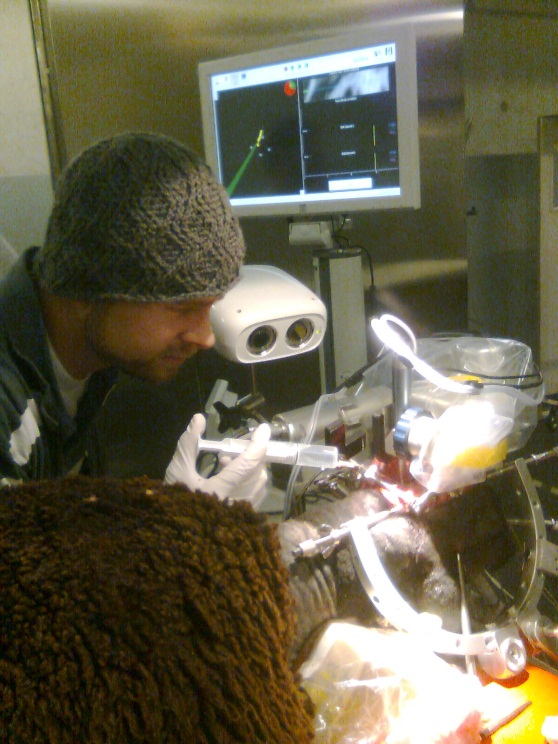 Am Mittwoch, dem 2. April 2014 um 13.00 Uhr wird Dr. Brett Bell eine Präsentation zum Thema „Inroads to Minimally Invasive CI Surgery” ” im ICCAS-Seminarraum halten.
Am Mittwoch, dem 2. April 2014 um 13.00 Uhr wird Dr. Brett Bell eine Präsentation zum Thema „Inroads to Minimally Invasive CI Surgery” ” im ICCAS-Seminarraum halten.
Bell erhielt 2003 einen BS in Mechanical Engineering von der Utah State University. Anschließend begann er ein direct-Ph.D.-program Biomedical Engineering an der Purdue University, wo er sich mit Biopolymeren und der Biomechanik von Zellen beschäftigte. Seit 2010 ist Dr. Bell Leiter der Robotic Surgery group, zunächst am Institute of Surgical Technology and Biomechanics (ISTB) und dann am ARTORG Center for Biomedical Engineering, Bern.
Derzeit untersucht er verschiedene Aspekte der klinischen Implementierung eines chirurgischen Robotersystems für die minimal-invasive Cochlea Implantation, einschließlich Sicherheit, chirurgischer Arbeitsabläufe und nicht-invasiver Registrierung. On Wednesday 2nd April 13:00, Dr. Brett Bell from the ARTORG Center for Biomedical Engineering Research, Image-Guided Microsurgery, University of Bern will give a presentation entitled “Inroads to Minimally Invasive CI Surgery” in the ICCAS seminar room.
On Wednesday 2nd April 13:00, Dr. Brett Bell from the ARTORG Center for Biomedical Engineering Research, Image-Guided Microsurgery, University of Bern will give a presentation entitled “Inroads to Minimally Invasive CI Surgery” in the ICCAS seminar room.
Dr. Brett Bell received a BS in mechanical engineering from Utah State University in 2003. He then began a direct PhD program Biomedical Engineering at Purdue University where he investigated biopolymers and cell biomechanics. Since 2010, Dr. Bell has been head of the Robotic Surgery group, first at the Institute of Surgical Technology and Biomechanics (ISTB) and then at the ARTORG Center for Biomedical Engineering, Bern.
Currently, Dr. Bell is investigating various aspects of a clinical implementation of a surgical robot system for minimally invasive cochlear implantation including safety, surgical workflow, and non-invasive registration.
24.03.2014
 Erfolgreiche Promotionsverteidigung von Sandra Schumann
Erfolgreiche Promotionsverteidigung von Sandra Schumann
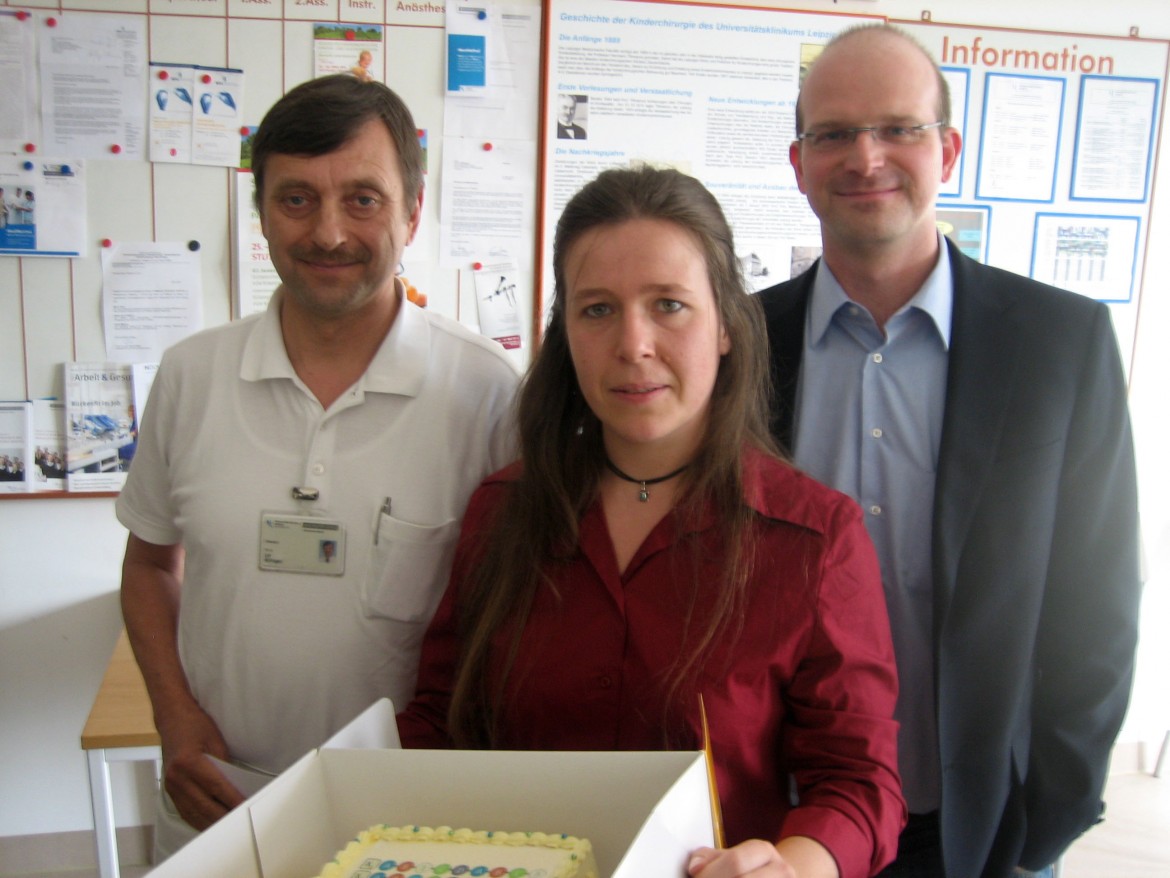 Am 19. März 2014 verteidigte Sandra Schumann erfolgreich ihre am ICCAS entwickelte Dissertation mit dem Titel „Evolution von Distanzmaßen für chirurgische Prozesse“. Die Veranstaltung fand am Universitätsklinikum Leipzig statt. Hier arbeitete die frisch gebackene Dr. rer. med. Schumann eng mit der Klinik und Poliklinik für Kinder- und Jugendmedizin zusammen. Für ihre Promotionsleistung erhielt die diplomierte Wirtschaftsinformatikerin und Physikerin magna cum laude.
Am 19. März 2014 verteidigte Sandra Schumann erfolgreich ihre am ICCAS entwickelte Dissertation mit dem Titel „Evolution von Distanzmaßen für chirurgische Prozesse“. Die Veranstaltung fand am Universitätsklinikum Leipzig statt. Hier arbeitete die frisch gebackene Dr. rer. med. Schumann eng mit der Klinik und Poliklinik für Kinder- und Jugendmedizin zusammen. Für ihre Promotionsleistung erhielt die diplomierte Wirtschaftsinformatikerin und Physikerin magna cum laude.
Schumann kam 2005 ans ICCAS, als hier noch Grundlagenforschung zur Workflow-Theorie in Anwendung auf chirurgische Prozesse betrieben wurde. In ihrer Doktorarbeit beschäftigte sie sich mit Distanzmaßen, die eine Voraussetzung für die optimale Verbesserung von Arbeitsabläufen im Operationssaal durch digitale Systeme sind.
Sandra Schumann ist seit September 2013 am Deutschen Zentrum für Luft- und Raumfahrt in Köln beschäftigt.
Das ICCAS gratuliert zum Doktortitel und wünscht der langjährigen Kollegin weiterhin viel Erfolg!
 On 19 March 2014, Sandra Schumann successfully defended her dissertation entitled “Evolution of distance measures for surgical processes”, which was developed at ICCAS. The event took place at the Leipzig University Hospital. Here the freshly qualified Dr. rer. med. Schumann worked closely together with the Department of Pediatric Surgery. For her doctoral accomplishments the graduated business computer scientist and physicist received magna cum laude.
On 19 March 2014, Sandra Schumann successfully defended her dissertation entitled “Evolution of distance measures for surgical processes”, which was developed at ICCAS. The event took place at the Leipzig University Hospital. Here the freshly qualified Dr. rer. med. Schumann worked closely together with the Department of Pediatric Surgery. For her doctoral accomplishments the graduated business computer scientist and physicist received magna cum laude.
Schumann came to ICCAS in 2005, when here was still conducted basic research on workflow theory in its application to surgical processes. In her doctoral thesis she dealt with distance measures, which are a prerequisite for improving workflows in the operating room by digital systems. Since September 2014 Sandra Schumann has been working at the German Aerospace Center (DLR) in Cologne.
ICCAS congratulates to the doctorate and wishes the long-serving colleague continued success.

19.03.2014
 Kolloquium zum „Lernen“
Kolloquium zum „Lernen“
In the next colloquium on 26 March 2014, Sara Hiller (M. Sc. Psychology) from the Bielefeld University will lecture on “Learning, knowledge acquisition and study design”. The speaker is working in the field of educational psychology. She will pass on her knowledge about information processing in learning processes. The lecture will take place at 2pm in the seminar room.

 Wissenschaftlicher Austausch auf der SPIE Medical Imaging – Conference
Wissenschaftlicher Austausch auf der SPIE Medical Imaging – Conference
From 15 to 20 February this year, Jens Meier and Mario Cypko took part in the SPIE Medical Imaging – Conference, which was host in San Diego, California (USA). The focus of the sessions and lectures, which were attended by the two young scientists, was in the areas of electronic management of patient data, patient information systems and clinical assistance systems in view of an increasingly evidence-based and personalized medicine.
In the lecture “A concept of a generalized electronic patient record for personalized medicine” Jens Meier presented the results and new approaches to the research of support systems for individualized diagnosis and therapy, which have been developed in cooperation with scientists from the Informatics and Image Processing Lab (IPILab) at the University of Southern California in Los Angeles. These include the provision and use of central database and complete electronic patient records, but also workflow assistance systems for the clinical practice and decision support systems to improve the treatment planning of head and neck tumors. The IT system “oncoflow”, which has been successfully used for a year at the Leipzig University Hospital, was also a topic of this presentation and received great attention.
The conference confirmed the future potential of the ICCAS-concept. The trend towards model- and evidence-based medicine was clearly noticeable. Contacts could be strengthened and expanded, such as with research institutes at RWTH Aachen and TU München.
[nggallery id=4]
17.03.2014
 Viel Kommunikation, Inspiration und ein Posterpreis für Mario Cypko in den USA
Viel Kommunikation, Inspiration und ein Posterpreis für Mario Cypko in den USA
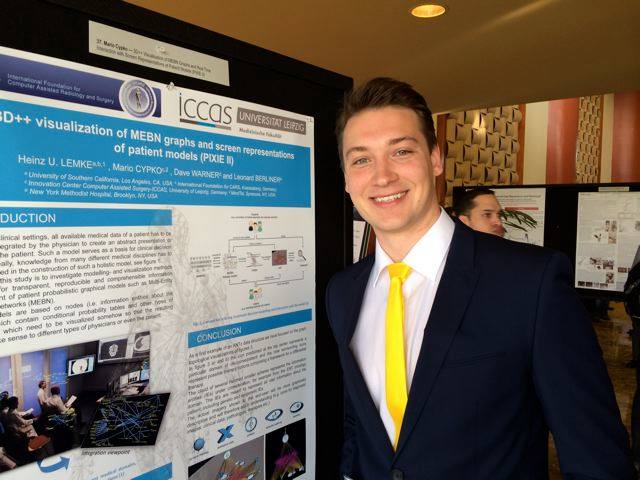 Anfang März 2014 endete Mario Cypko’s erfolgreiche Forschungsreise in die USA, deren bedeutende Stationen die SPIE Medical Imaging – Conference, die NextMed/MMVR21 Conference sowie ein Besuch der University of Southern California (USC), Los Angeles waren.
Anfang März 2014 endete Mario Cypko’s erfolgreiche Forschungsreise in die USA, deren bedeutende Stationen die SPIE Medical Imaging – Conference, die NextMed/MMVR21 Conference sowie ein Besuch der University of Southern California (USC), Los Angeles waren.
Der Nachwuchswissenschaftler aus der DPM-Gruppe punktete abermals mit einem Posterbeitrag und erntete den Posterpreis der NextMed/MMVR Conference 2014 für die Arbeit mit dem Titel „3D++ visualization of MEBN graphs and screen representations of patient models (PIXIE II)”. Auch Cypko’s Präsentation auf selbiger Konferenz zum Thema „User interfaces for patient-specific treatment – decision models using MEBN“ stieß bei den wissenschaftlichen Kollegen auf reges Interesse. Die Modellierung und Visualisierung von Patientendaten mit dem Ziel eines transparenten und nachvollziehbaren Therapie-Managements ist ein brandaktuelles Thema. Mit der Entwicklung von Unterstützungssystemen für die Therapieentscheidung hat sich die Forschungsgruppe DPM, in der Cypko tätig ist, sogar ein weltweites Alleinstellungsmerkmal geschaffen.
Cypko’s Konferenzbeiträge bewirkten, dass das Institute of Creative Technology der USC ihn spontan einlud. Hier durfte er im Mixed Reality Lab seine Projektarbeiten präsentieren und sich im Gegenzug über die dortigen Forschungsprojekte informieren. Das Lab beschäftigt sich mit der Entwicklung von günstigen, allgemein verwendbaren Benutzerschnittstellen.
Den Abschluss seiner Forschungsreise bildete ein Besuch des Instituts Image Processing and Informatics Laboratory der USC. Der Schwerpunkt des Treffens lag bei den von Cypko verwendeten Multi-Instanz Bayesschen Netzen zur Modellierung von Therapieentscheidungen.
Beide Institute begrüßten eine zukünftige Zusammenarbeit mit dem ICCAS. Weitere Gespräche dazu sollen nun folgen. In early March 2014, Mario Cypko’s research trip to the USA ended sucessfully. Major stations of the journey were the SPIE Medical Imaging Conference, the NextMed / MMVR21 Conference and the University of Southern California (USC), Los Angeles.
In early March 2014, Mario Cypko’s research trip to the USA ended sucessfully. Major stations of the journey were the SPIE Medical Imaging Conference, the NextMed / MMVR21 Conference and the University of Southern California (USC), Los Angeles.
The young scientist from the DPM group scored again with a poster contribution and won the poster prize of the NextMed / MMVR Conference 2014 for his poster entitled „3D++ visualization of MEBN graphs and screen representations of patient models (PIXIE II)”. Furthermore, Cypko’s presentation on „User interfaces for patient-specific treatment – decision models using MEBN“ was met with great interest among the scientific colleagues at the NextMed / MMVR. The modeling and visualization of patient data with the aim of a transparent and comprehensible therapy management is a very current topic.
Cypko’s research contributions prompted the Institute of Creative Technology at the USC to invite him spontaneously. Here he had the opportunity to present his project work at the Mixed Reality Lab and in return to learn about the local research projects. The Lab focuses on the development of low cost user interfaces for general use.
The trip concluded with a visit of the Institute Image Processing and Informatics Laboratory at the USC. The focus of this meeting was on the use of Multi-Entity Bayesian Networks for modeling of treatment decisions.
Both institutions welcomed a future collaboration with the ICCAS. Further talks will follow.
 Usability Experte zu Gast im ICCAS – Kolloquium
Usability Experte zu Gast im ICCAS – Kolloquium
Am Mittwoch, dem 05. März 2014, findet um 14:00 Uhr im Seminarraum ein weiteres Kolloquium, diesmal mit dem Usability Experten Lucas Koch, statt. Der im Fachbereich Informatik und Kommunikationssysteme an der Hochschule Merseburg tätige Referent wird in seinem Vortrag die neuesten Kenntnisse zur gebrauchstauglichen und nutzerfreundlichen Schnittstellenentwicklung nach internationaler Standardisierung vorstellen.A further colloquium will take place in the seminar room on Wednesday 05 March 2014 at 2 pm, this time with the usability expert Lucas Koch. The referee is working in the Department of Computer Science and Communication Systems at the Hochschule Merseburg – University of Applied Sciences. He will present the latest knowledge about utilizable and user friendly interface development towards international standardization.
 Prof. Melzer gibt Auftakt zum Kolloquium 2014
Prof. Melzer gibt Auftakt zum Kolloquium 2014
Den Auftakt zum diesjährigen ICCAS-Kolloquium wird der renommierte Wissenschaftler Prof. Andreas Melzer, Leiter des Instituts für Medizinische Informatik und Technologie (IMSaT) der Universität Dundee (Schottland), geben.
Der Vortrag mit dem Titel „Clinical Decision Support by Medical Imaging – personalised image guided therapy by modelling and simulation: FUSIMO“ findet am Montag, dem 03. März 2014 um 15:00 Uhr im ICCAS-Seminarraum statt.
The prelude to this year’s ICCAS-Colloquium will give the renowned scientist Professor Andreas Melzer, director of the Institute for Medical Science and Technology (IMSaT) of the University of Dundee (Scotland).
The presentation entitled “Clinical Decision Support by Medical Imaging – personalised image guided therapy by modeling and simulation: FUSIMO” will take place in the ICCAS seminar room, at 3pm on Monday, 03 March 2014.
 Sehr positive Bewertung der Lehrveranstaltung „Einführung in die Computerassistierte Chirurgie”
Sehr positive Bewertung der Lehrveranstaltung „Einführung in die Computerassistierte Chirurgie”
Die im Januar dieses Jahres durchgeführte Vorlesungsreihe “Einführung in die Computerassistierte Chirurgie” erhielt von den teilnehmenden Medizinstudenten eine sehr positive Bewertung. Dies spricht für die hohe Lehrqualität der Dozenten, aber auch für das stärker werdende Interesse an der Thematik, denn computergestützte Assistenzsysteme halten mehr und mehr Einzug in die routinemäßige chirurgische Praxis.
Den angehenden Medizinern wurden technische Grundkenntnisse u. a. zur Bildverarbeitung, Navigation, Robotik und Simulation, aber auch zum Risiko- und Workflowmanagement vermittelt. In klinischen Modulen stellten Ärzte die Anwendung von chirurgischen Assistenzsystemen für einzelne Fachgebiete vor. In einem praktischen Teil konnten die Teilnehmer modernste Technologien im ICCAS-Demo-OP selbst erproben.The lecture series “Introduction to Computer Assisted Surgery”, arranged in January 2014, received a very positive evaluation by the participating medical students. This speaks for the high teaching quality of the lecturers, but also for the increasing interest in this subject, because computer-based assistance systems find more and more their way into the routine surgical practice.
In technical modules, the medical students learned basic knowledge about image processing, navigation, robotics and simulation, but also about risk- and workflowmanagement. In medical modules, physicians introduced the application of surgical assistance systems for particular disciplines. The participants could also test innovative technologies in a practical session in the ICCAS demo-OR.

 ICCAS-Jahresbericht 2013
ICCAS-Jahresbericht 2013
The latest annual report presents the research of the ICCAS that have been made by our scientists in 2013. It shows the structure of the ICCAS and contains information about the manifold activities and achievements within the scientific community of computer-assisted surgery.
The annual report can be viewed under the following link: Annual Report 2013
